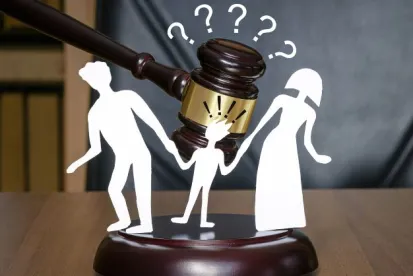What comes to your mind when you find yourself passing through the cereal aisle at your local Target or Wal-Mart? One cannot help but notice the overwhelming number of choices Americans are given in the cereal aisle. There is a cereal for seemingly each and every palate known to humankind.
For this author, I cannot help but associate the ocean of cereal choices with the plethora of diagnoses that make up the Diagnostic and Statistical Manual of Mental Disorders (DSM). The DSM is considered, or has been considered, the bible, or guide, to diagnosing mental disorders.
It can be difficult to pinpoint which version of the DSM is the most recent; it appears to be the “text revision” released in 2022, known as the DSM-5-TR. The DSM-5-TR includes certain disorders that beg the question whether and to what extent we are entering (or have entered) a point in time where, to some degree, we all have a disorder.
It is with that in mind that I urge you to consider the Appellate Division, Third Department’s decision in Matter of Virginia OO v. Alan PP, 2023 N.Y. Slip Op. 1120 (NYLJ March 3, 2023). Matter of Virginia concerned an appeal from an order of the Family Court of Tompkins County granting an application to modify a prior order of custody.
The divorced parents shared one child together, born in 2012. In short, the father/respondent contended that the Family Court erred in finding that the mother/petitioner had established a change in circumstances warranting a change in custody.
This article will not explore the many facets of the decision. Instead, it will focus on one aspect at the tail end of the decision. The father requested that mental health evaluations be ordered for the parties. This is a standard request that is often granted by the court. On that point, the decision states “we are unpersuaded by the father’s contention that Family Court erred by deciding not to order forensic or mental health evaluations of the parties. Given that he did not produce any evidence suggesting that the mother had any mental illness, we do not find that it was an abuse of discretion for the court to deny this request.”
That brings us to the important question raised by Matter of Virginia: when one parent in a custody litigation demands that a forensic custodial evaluation should be ordered by the court, and the other parent takes the position that a forensic custodial evaluation is unnecessary, should the court (a) order the evaluation, for the simple reason that one parent requested it and any and all parents in custody litigation have a fundamental human right to demand such an evaluation as a matter of due process; or (b) make a preliminary determination, or finding, as to whether there is sufficient evidence that either or both parents have a “mental illness” before ordering the forensic custodial evaluation. There is no clear-cut answer, and this article does not purport to provide one. The issue, however, merits further discussion.
The work performed by forensic custodial evaluators has been under scrutiny in the State of New York in recent years. In 2021, then Governor Andrew Cuomo appointed a Blue-Ribbon Commission on Forensic Custodial Evaluations to provide recommendations regarding if and/or how forensic custodial evaluations should be used by New York courts.
The report of the Blue-Ribbon Commission states that “the members could not reach uniform consensus on whether forensic custody evaluations should continue to exist within the court system. By an 11-9 margin, a majority of commission members favor elimination of forensic custody evaluations entirely, arguing that these reports are biased and harmful to children and lack scientific or legal value.”
Forensic custodial evaluations come with an emotional and financial cost for families involved in custody litigation. It is not every day—or any day for that matter—that our children are all of a sudden introduced to Dr. So and So who is conducting a forensic evaluation because Mom and Dad cannot agree on parenting time and/or decision-making. Forensic custodial evaluations can take many months to complete, and in certain circumstances, as the report notes, they have costs ranging from “$4,000 to five or even six-figures” (emphasis added).
If a survey were to be conducted of custody litigants who went through the forensic custodial evaluation process, I would anticipate based on experience that the results would be all over the map. Some clients find that the forensic report is spot on. Others read the forensic report, after waiting months on end at great cost, only to find themselves deeply disappointed because, in their view, the forensic completely missed the mark in evaluating the other parent.
Matrimonial practitioners reading this article have undoubtedly come across forensic reports in their cases that note, for example, the various relationships that a parent had while dating in college, and how those relationships ended. Then there are forensic reports that document each and every aspect of the parent being interviewed from the particulars of what they wore to the interview (top to bottom) to how they presented in terms of their mood (warm, dejected, cheery, affable, short, etc.). When a court is tasked with figuring out how to determine a custody dispute, do any of these details matter?
Maybe, these types of details are relevant. After all, the DSM’s expansion of disorders begs the question whether and to what extent a forensic custodial evaluator can find some evidence of some disorder based on facts that the average layperson with no mental health training (lawyers largely included) would gloss over or disregard entirely.
DSM-5-TR has a new disorder titled “prolonged grief disorder.” Have a look at the criteria for this disorder. If grief is now pathologized, what is coming next? Anyone who has suffered a death, or deaths in the family, knows full well that the Hallmark Card concept of “closure” is patently ridiculous. While I do not rule out that someone could become debilitated over grief on a long-term basis, there is value in questioning whether or not the limits of pathology are being pushed too far, which, in turn, may have an increasingly large (and not necessarily positive) impact on matrimonial practice.
In her recent article in the New York Times Magazine titled “Domestic Disturbance,” Orna Guralnik, a couples therapist, wrote the following:
One of the most difficult challenges for couples is getting them to see beyond their own entrenched perspectives, to acknowledge a partner’s radical otherness and appreciate difference and sovereignty. People talk a good game about their efforts, but it’s quite a difficult psychological task. To be truly open to your partner’s experience, you must relinquish your conviction in the righteousness of your own position; this requires humility and the courage to tolerate uncertainty (emphasis in original).
And with that in mind, when our clients assert “my husband is a narcissist,” or “my wife is borderline,” as matrimonial practitioners we are faced with a difficult path. That path is trying to figure out whether or not the other spouse does, in fact, have a genuine mental illness versus the other spouse simply being “Just a Real God**** Piece of ****.”
I put that in quotes because there is a phenomenally hilarious “article” on the Internet purporting to claim that the DSM-6 will include a diagnosis for “Just a Real God**** Piece of ****.”
Only time will tell if the DSM is truly veering towards “Just a Real God*** Piece of ***” disorder or something comparable to it.
Where does that leave us? How are matrimonial lawyers, and judges, with what the Blue-Ribbon Commission Report describes as “little to no professional training in understanding family dynamics better known to behavioral health practitioners,” supposed to figure out whether or not a parent is actually diagnosable versus nothing more than your average jerk. Stated differently, to pick up on Orna Guralnik’s article, is your client prioritizing the “righteousness” of his/her own position over everything else, or is he/she accurately conveying information about a mental illness on the part of his/her spouse.
Perhaps the best answer can be gleaned from Matter of Virginia, and that is, ask your client questions (many of them) to make an informed assessment as to whether or not there is actual “evidence” of a mental illness before deciding whether or not to request a forensic custodial evaluation.
When your client asks “should I request a forensic custodial evaluation,” it is this author’s strong view that you are not adding value to your client by being a “Yes-man” or “Yes-woman.” Immediately weaponizing psychology carries risk; perhaps you will give your client a short-lived dopamine rush by labeling his/her spouse with this or that disorder, but as Matter of Virginia implies (to me), there is more value to add to your client by having “evidence.”
Labels are easy toss around, but gathering evidence is another matter. With evidence in hand, you can acquire the information needed to try to protect the safety and well-being of a child. All of this is to say that a forensic custodial evaluation is a major undertaking. Tread carefully, whatever you decide.



 />i
/>i
